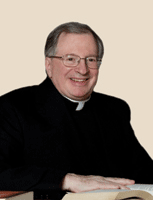Every author has an image of St. Paul. For Martin Luther he was an enemy of works-righteousness. When I first studied Paul, he was regarded as the primordial dogmatic theologian, the source for doctrines like justification, original sin and the Mystical Body of Christ. More recently, among sociological exegetes the image of Paul as an enemy of Roman power and the archetypal critic of imperial domination has been popular. In this issue, the editors have invited some leading Scripture scholars to share their impressions of Paul in observance of the Pauline Year.
Frequently an image reveals the preoccupation of an age. I remember from my graduate school days the late Richard A. McCormick, S.J., and his close friend the late Bruno Schüller, S.J., belittling Paul’s ethics as paranesis (Greek for exhortation). It was some time before I realized they had been voicing a prejudice of mid-20th-century German Protestant theology that serious scriptural texts dealt with the great theological themes beloved of the Reformation, like Law and Gospel, spirit and flesh, sin and grace. For that reason, they believed Paul’s ethical passages could be dismissed as mere motivation or exhortation. In fact, some of Paul’s profoundest theology—like the hymn to Christ in his self-abandonment (Phil 2:4-11): “Have this mind in you which was in Christ Jesus...”—comes in the midst of a plea for mutual service.
For me Paul is a pastoral theologian, penning his theology while addressing disputes within the communities he had founded. The much discussed passage on “the mystery of the Jews” (Rom 11:25-32), a key text in today’s Catholic-Jewish dialogue, emerged out of his personal perplexity over the rejection of the Gospel by the vast majority of his fellow Jews. His eucharistic theology—“For this is what I received from the Lord and passed on to you...” (1 Cor 11:21-27)—was occasioned by his correction of the Corinthians for the class divisions in their communities, just as his theology of baptism (Rom 6:1-11) was a repudiation of libertines who would use freedom from the Mosaic law as a warrant for self-indulgence.
From my late friend Bill Spohn I learned a special appreciation for the loving bond Paul had with the communities he founded. Sometimes, of course, he sounds like an overly sensitive parent. But a reader needs only examine the prayers he makes for these communities to appreciate how much he esteemed them.
To the Romans he wrote: “I never fail to mention you in my prayers and ask to be allowed at long last the opportunity to visit you, if he so wills. For I am longing to see you either to strengthen you by sharing a spiritual gift with you, or, what is better, to find encouragement among you for our common faith” (Rom 1:10-1). To the Corinthians he wrote: “I never stop thanking God for all the graces you have received through Jesus Christ. I thank him that you have been enriched in so many ways...so that you will not be without any of the gifts of the Spirit, while you are waiting for our Lord Jesus Christ to be revealed” (1 Cor 1:4-7). The joy Paul takes in the spiritual progress of his churches is one every priest, deacon and lay ecclesial minister should know.
With the divisions in the U.S. church today over abortion and electoral politics, Paul’s insistence on the unity of the church in charity is especially relevant. Again and again he pleads for mutual deference and forgiveness. He reproves division: over apostolic origins (Cephas, Apollos, Paul), ethnic heritage, class divisions and, appropriately for us, moral perfectionism. Remarkably, he pleads for charity over moral principle (1 Cor 10:23-11:1). As Pheme Perkins puts it, “The individual may be ‘right’...acting out of full conviction...and yet ‘wrong’ because of [the] effects [of moral absolutism] on the other members of the community.” Or, as the late Krister Stendahl wrote, Paul’s principle is “love rather than integrity.”
For Paul, however, love meant mutual deference, each one ceding to the other, each faction respecting the other, acting, as he writes in a stunning phrase, “for the other’s scruples, not your own.” No standing on principle, just “being helpful to everyone at all times.”
“Take me,” Paul urged, “as your model, as I take Christ.” In our fractured American church, Paul is a pastor we would do well to emulate.








